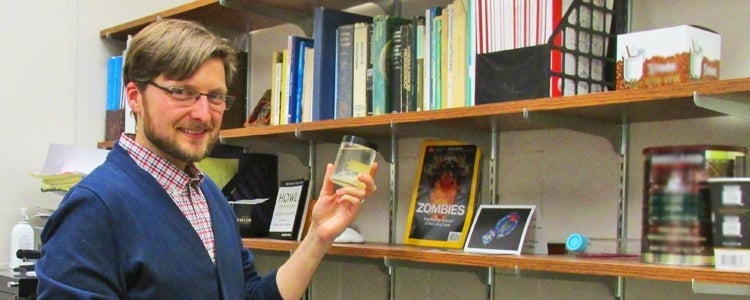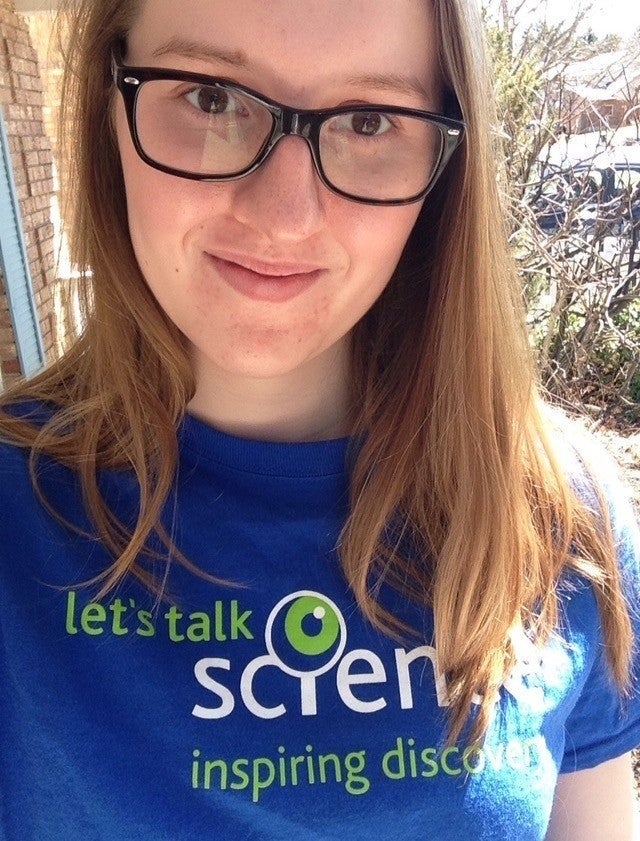Editor:
Brandon Sweet
University Communications
bulletin@uwaterloo.ca
Tales of a Teacher: Marcel Pinheiro

By Kelly Stone. This is the second of three Centre for Teaching Excellence Teaching Stories that will be featured in the Daily Bulletin this week.
When teaching content-heavy courses, such as BIOL 110: Introductory Zoology, it can be difficult to sustain the learners’ attention — especially when those learners are first-year students, already overwhelmed by the transition from high school to university. As an instructor for Biology courses such as 110 and 414, Dr. Marcel Pinheiro strives to ensure that his classroom is a place where students want to learn. Being an instructor for first-year students makes for an exciting opportunity because “you have infinite potential,” Pinheiro explains. “They’re not jaded yet. They don’t know what to expect, so you can try to show them things they may not see again for another two years.”
Taking abstract content and contextualizing it in real-world scenarios is one way Pinheiro works towards creating an engaged classroom. With BIOL 110, Pinheiro says that making content relatable “can be difficult when you are talking about something that lives at the bottom of the sea.” For this reason, Pinheiro includes videos whenever possible during his lectures: “The nice thing about zoology is that you can show them before you tell them. You can say, ‘Hey! Look at this octopus doing this crazy thing! Now let’s learn about octopuses.’” Providing students with in-class videos to pique their interest is a teaching strategy that Pinheiro implemented at the beginning of his teaching career. Videos are “much more powerful and much more memorable. You’re going to remember something you saw, like an octopus rolling around in a coconut shell, for much longer than if I were to simply tell you about it.”
As class sizes increase, student participation in the classroom tends to decrease. Pinheiro uses technologies such as Clickers in class and Twitter outside of class to continually encourage students to interact and participate. Clickers help students overcome their timidity when responding to in-class questions; they can also be used to generate peer discussion about the topics being taught. Pinheiro uses Twitter to provide students with links to videos shown in class, articles depicting real-world applications of material, and also for providing quick exam tips. For Pinheiro the exam tips are “an easy way to grab the attention of students because they are going to get a concrete benefit.”

Another way Pinheiro keeps students engaged and focused is by highlighting which concepts are especially important. He does this by placing an image of a key on PowerPoint slides that reference key concepts. By highlighting these essential concepts, Pinheiro reduces the number of questions that students have regarding the parameters of their midterms and the final exam. These visuals help students understand how to structure their studying: “They see that key and know that that’s an anchoring point where things will start from, and then build from there.”
Striving for an engaged classroom is something Pinheiro is continually working towards — but of course it all starts with students coming to class. Pinheiro encourages them to attend and “actively participate in any way you can – and I’m not talking about putting up your hand and asking questions, though that would be lovely. Just having a notepad and writing down important ideas that the professor is emphasizing. If you don’t come to class, you lose the reason for being here, which is to learn from someone interested, excited, and in love with what they do.”
A former student of Dr. Pinherio's offered their own perspective on Pinheiro's teaching methods; Sam Shaw said, "Dr. Pinheiro is easily one of the most animated professors I've ever been in lecture with. You can tell that he loves what he's teaching, and that makes his lectures that much more interesting and easy to listen to."
Science student volunteers her way to success

By Andreea Perescu.
Samantha Fowler wants you to get excited about science.
This term, she secured her dream co-op position as an Outreach Associate at Let’s Talk Science outreach Waterloo, a charitable organization with programs that span over 40 post-secondary outreach sites. Her hands-on role has allowed her to do what she excels at, which is to educate students of all ages about the value of science. Fowler organizes over twenty Let’s Talk Science workshops a week.
“I heard about Let’s Talk Science when I volunteered for the University of Waterloo’s Science Open House in my first year,” said Fowler. “I had the most amazing day volunteering in the physics room, even though I wasn’t a physics student, and I knew that I wanted to continue. The next chance I got, I signed up to become a volunteer.”
The organization delivers unique learning programs to children and youth across Canada. Beyond outreach, Let’s Talk Science also features four additional programs: Let’s Talk Science Challenge, IdeaPark, Tomatosphere and CurioCity. Each program is dynamic, offering students a variety of approaches. Tomatosphere even sends tomatoes into space!
Entering her third year Bachelor of Science in psychology with a biology minor, Fowler’s enthusiasm for Let’s Talk Science comes through in her work ethic. Beyond prepping and organizing outreach events, Fowler designed her own workshop to help spread awareness of mental illness.
“I have always been interested in mental health because people don’t talk about it even when it is so prevalent. You’re allowed to call in sick because you have the flu, but not because your anxiety is too severe to get out of bed that day,” explained Fowler. “One of the new workshops I helped develop for the summer is called The Science of Mind Reading. It is a psychology kit that ties in preexisting activities with new activities I found. It is intended to teach the students about the biology and psychology that controls our behaviour, and how we can manipulate or trip up our brain!”
Now, Fowler is set on pursuing a long-term role within the organization. “Let’s Talk Science is the reason behind my new career path,” said Fowler. “I came into university dead set on entering neuroscience research, but Let’s Talk Science showed me my passion for teaching and education.”
Girls summer camp aims to make an IMPACT

The Waterloo Aboriginal Education Centre in St. Paul's University College in partnership with the HeForShe IMPACT 10x10x10 framework and Engineering Science Quest (ESQ) is hosting the first IMPACT Girls Summer Camp from Wednesday, August 10 to Saturday, August 13.

The participants, drawn from all over southern Ontario, are Indigenous girls in grade 7 and 8 and their caregivers.
The IMPACT Girls' Summer Camp runs for two and a half days with the goal of promoting awareness and building confidence in girls to consider a career in STEM (Science, Technology, Engineering, Math) disciplines.
The camp will build awareness of post-secondary education opportunities while incorporating Indigenous cultural teachings and practices, developing the confidence of the camp attendees to pursue greater goals while being encouraged and supported by their caregivers in a fun environment.
The University’s HeForShe initiative has covered all the campers' attendance fees, including travel costs.
Campers will stay in residence rooms at St. Paul's and will have all meals provided.
The summer camp is a pilot project with the goal of increasing Indigenous female student participation in STEM experiences and academic careers to build the pipeline of future female leaders in traditionally male dominated disciplines in accordance with Waterloo's HeForShe commitments.
Wednesday's notes
Plant Operations has announced that Fast Track Maintenance will be completing window cleaning throughout the remainder of August. The maintenance will take place according to the following dates and locations:
- Quantum Nano Center - August 15th - 19th
- Dana Porter Library - August 22nd - 23rd
- East Campus Hall - August 22nd - 23rd
- RAC 1 - August 24th - 25th
- RAC 2 - August 24th - 25th
- Engineering 3 - August 24th - 25th
Any questions regarding the operation can be directed to the General Maintenance line at ext 36318 or pltops.workorders@waterloo.ca.
Beginning August 29th, Key Control will be relocating temporarily to GSC 1102. Access will be available from the GSC main entrance door off DC/MC Service Road. This is same entrance used to access Plant Operations Administration and where HR was once located.
Link of the day
When and where
Quantum Cryptography School for Young Students (QCSYS), Friday, August 5 to Friday, August 12, QNC 0101.
Conrad Grebel Peace Camp, Monday, August 8 to Friday, August 12, Conrad Grebel University College.
Impact Girls Summer Camp, Wednesday, August 10 to Saturday, August 13, St. Paul's University College.
Chemistry Department Seminar Series featuring Professor Darren Derksen, Department of Chemistry, University of Calgary, “Natural Products as Inspiration for Novel Therapeutics - Opportunities and Challenges”, Wednesday, August 10, 3:30 p.m., C2-361.
Chemistry Department Seminar Series featuring Professor Maxim Berezovski, Department of Chemistry and Biomolecular Sciences, University of Ottawa, “A Thousand Faces of the Aptamers: Cell Isolation, Biomarker Discovery, Pathogen Detection”, Thursday, August 11, 10:30 a.m., C2-361.
The Writing Centre presents Grammar Studio Series, Making it shine: Conciseness and revision strategies," Thursday, August 11, 11:00 a.m. to 1:00 p.m.
The Faculty of Arts presents a Computational Rhetoric Workshop, Friday, August 12 to Sunday, August 14.
On-campus examinations end, Saturday, August 13.
UWRC Book Club featuring Indian Horse by Richard Wagamese, Wednesday, August 17, 12:00 p.m., LIB 407.
Biomedical Discussion Group, Thursday, August 18, 3:30 p.m. to 4:30 p.m., STC 1019.
Sparking an interest in Science: Waterloo Science Outreach at Kidspark, Sunday, August 21, 11:00 a.m. to 5:00 p.m., Victoria Park, Kitchener.
Warrior Football Alumni and Friends golf tournament, Monday, August 22.
Deadline for students to be Fees Arranged, Wednesday, August 24.
Co-operative Work Term ends, Friday, August 26.
Co-operative Work Term begins, Monday, August 29.
International Student Orientation, Friday, September 2 to Sunday, September 4.
Orientation 2016, Sunday, September 4 to Saturday, September 10.
Out-of-province/American Orientation, Sunday, September 4.
Labour Day holiday, most University operations closed, Monday, September 5.
Exchange/Study Abroad Orientation Monday, September 5.
Transfer Student Orientation, Monday, September 5.
Graduate Student Orientation, Tuesday, September 6.
Lectures begin, Thursday, September 8.
The Writing Centre presents "Professionalism in your communication: How to talk to your professors," Tuesday, September 13, 10:00 a.m. to 12:00 p.m.
Writing Centre presents "STEM lab reports: Improve your lab report writing," Thursday, September 15, 1:00 p.m.
Waterloo Centre for German Studies presents "Von Berlin to Kitchener: Connotations and Cultures, A Discussion Panel", Thursday, September 15, 7:00 p.m., Kitchener Public Library.
Doors Open Waterloo Region, Friday, September 16 to Saturday, September 17.
The Writing Centre presents Tri-Agency Scholarships (NSERC, SSHRC, CIHR), Friday, September 16, 10:00 a.m.
The Writing Centre presents Literature reviews for grads (Part A): Organizing research, Friday, September 16, 1:00 p.m. to 3:00 p.m.
The Writing Centre presents Say it in your own words: Paraphrase & summary, Monday, September 19, 1:00 p.m. to 3:00 p.m.
UWRC Book Club featuring House in the Sky by Amanda Lindhout, Wednesday, September 21, 12:00 p.m., LIB 407.
New vistas in electrochemical energy storage, Friday, September 23.
Ontario Universities' Fair, Friday, September 23 to Sunday, September 25, Metro Toronto Convention Centre.
PhD oral defences
School of Planning. Tanya Christidis, "Wind Turbines in Ontario: An Examination of Perceptions and Potential Health Effects, and How They Relate to Policy and Decision-Making Processes." Supervisors, Geoffrey Lewis, Philip Bigelow. On display in the Faculty of Environment, EV1 335. Oral defence Monday, August 15, 10:00 a.m., EV1 221.
Physics and Astronomy. Yu Chai, "Surface Dynamics, Glass Transition, and Crystallization of Atactic Polystyrene." Supervisor, James Forrest. On deposit in the Science graduate office, PHY 2013. Oral defence Tuesday, August 16, 9:00 a.m., PHY 352.
School of Public Health and Health Systems. Dwayne Van Eerd, "Knowledge Transfer and Exchange in Work and Health Research." On display in the Faculty of Applied Health Sciences, BMH 3110. Oral defence Tuesday, August 16, 1:00 p.m., BMH 3119.
Psychology. Ivana Lizdek, "Temporal Dynamics in the Interpersonal Behaviour and Perceptions of Romantic Partners." Supervisor, Erik Woody. On deposit in the Arts graduate office, PAS 2428. Oral defence Wednesday, August 17, 10:00 a.m., PAS 3026.